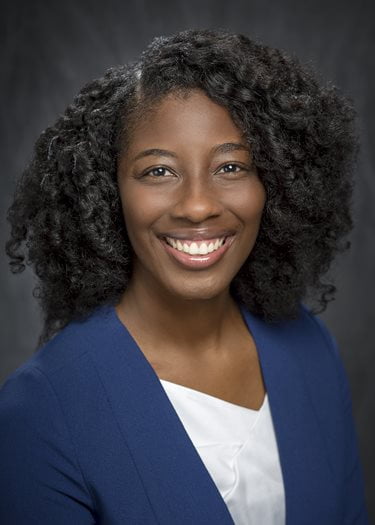Thursday, Jun 05, 2025
• Jaelon Jackson :
By Jaelon Jackson
School of Social Work

SSW Assistant Professor, Dr. Danielle Harrell
A University of Texas at Arlington professor is shining a light on the hidden mental health challenges facing youth with disabilities, particularly those suspended or expelled from school.
Dr. Danielle R. Harrell, assistant professor in the UTA School of Social Work, recently published research revealing that children with disabilities who have experienced exclusionary discipline practices are three times more likely to report suicidal ideation than their peers. Her work, grounded in a cumulative risk model, explores how intersecting social, emotional and systemic stressors can drastically impact a child’s well-being.
“Disability status and exclusionary practices reinforce each other,” Harrell said. “Together, they isolate students, cut them off from school-based support, and increase their vulnerability to psychological distress.”
Harrell’s research focuses on suicide risk among youth exposed to multiple adverse experiences—ranging from neighborhood violence to negative peer relationships. She uses quantitative, qualitative and mixed-method approaches to better understand what drives or prevents mental health disparities in K-12 schools.
Her recent studies draw from nationally representative datasets, including the Adolescent Behaviors and Experiences Survey and the Future of Families and Child Wellbeing Study. Among her key findings: exposure to neighborhood violence was associated with a 38% increase in suicide attempts, and children with disabilities and a history of school suspension were significantly more likely to experience suicidal ideation.
“Many of these children live in a constant state of hypervigilance,” she said. “When violence becomes normalized, and access to support is limited, kids internalize stress in harmful ways.”
Dr. Tonya Hansel, associate dean for research at the School of Social Work, says Harrell’s work exemplifies the kind of impactful, mission-driven scholarship that defines the UTA SSW research community.
“Dr. Harrell’s dedication to understanding suicide risks and prevention among this vulnerable population is the epitome of social work research,” Hansel said. “What distinguishes social work research from other disciplines is the dedication to answering the ‘so what?’ of research. Answering why the research matters, in addition to gaining knowledge, allows for real-world solutions to the most pressing social problems—all research at UTA SSW is doing just that.”
Hansel said the relevance of Harrell’s work stands out, especially in light of suicide being the second leading cause of death among youth ages 10 and up.
“As a society we cannot ignore this growing health crisis, and this is met with bipartisan support on preventing death by suicide,” Hansel said. “Dr. Harrell’s work addresses primary risk factors including bullying, mental health, neighborhood violence, isolation and disabilities—areas that we need to address for prevention and to improve the overall well-being of our youngest citizens.”
Harrell, a licensed clinical social worker in Texas and Louisiana, brings nearly a decade of practice experience in school social work, mental health and child welfare. Her academic training includes a Ph.D. in social work with a minor in educational research from Louisiana State University, and a bachelor’s degree in psychology from the University of Louisiana at Lafayette.
Her research also highlights differences in how mental health challenges show up by age group. Among adolescents, depression and substance misuse are primary risk factors, but for younger children, Harrell said impulsivity, ADHD and aggressive behavior are often linked to suicidal thoughts.
“The way risk manifests looks very different in a 9-year-old than it does in a 17-year-old,” she said. “We need to tailor our assessments and interventions to reflect that.”
In addition to studying youth risk factors, Harrell has examined the current state of school mental health services. In a 2025 Journal of School Health article, she and her co-authors found that school social workers often face blurred roles, limited staffing and a lack of formal models to guide their work. Many are assigned administrative or disciplinary duties that pull them away from clinical support.
“School social workers are trained mental health professionals, but their capacity is often stretched so thin that they can’t engage in the consistent, therapeutic work students really need,” Harrell said.
Due to the scope of Harrell’s studies, Hansel said Harrell’s research is well-positioned to contribute to future policy and practice shifts.
“Schools were established to educate, but over the years we have discovered how mental health plays a critical role in the ability to learn,” she said. “While education and mental health are inextricably linked, schools lack the funding and support to fully implement both. Dr. Harrell’s work contributes to identifying ways to support school systems in achieving both learning and well-being.”
Hansel also pointed to broader institutional partnerships as a path forward.
“University partnerships like those between UTA SSW and local school districts are an excellent way to increase services to the schools, but also follow the university and professional mission of creating positive change with community partners,” she said.
She also noted the lingering effects of the COVID-19 pandemic, particularly on students who lived through remote learning during key developmental years.
“We’re seeing increased digital dependency, social delays and difficulty with face-to-face communication,” Harrell said. “These aren’t just temporary issues—they’re shaping how kids navigate school and relationships long-term.”
Harrell advocates for trauma-informed, culturally responsive practices in schools, especially for students facing identity-based bullying or immigration-related stigma. She pointed to cases like Jocelynn Rojo Carranza, an 11-year-old Hispanic student bullied for being undocumented, as an urgent call to action.
“Culturally responsive approaches help students feel seen and respected,” she said. “That’s essential for fostering belonging and resilience.”
Harrell also encourages future school social workers to consider a background in psychology. As someone who took that path herself, she believes the two disciplines complement each other in understanding behavior and supporting students holistically.
Looking ahead, she hopes schools will expand their mental health efforts by including broader staff training, family engagement and universal screening tools to identify at-risk youth early.
“We have to think beyond the counselor’s office,” Harrell said. “Every adult in a school building has a role to play in creating safe, supportive environments.”
